Customer Service Managers are the backbone of any customer-centric organization. They ensure that customer service teams deliver high-quality support, resolve issues promptly, and maintain customer satisfaction.
Skills required for a Customer Service Manager include strong communication, leadership, and problem-solving abilities. Additionally, they need to be adept at conflict resolution and possess a deep understanding of customer service software and tools.
Candidates can write these abilities in their resumes, but you can’t verify them without on-the-job Customer Service Manager skill tests.
In this post, we will explore 7 essential Customer Service Manager skills, 7 secondary skills and how to assess them so you can make informed hiring decisions.
Table of contents
7 fundamental Customer Service Manager skills and traits
The best skills for Customer Service Managers include Communication Skills, Problem Solving, Decision Making, Empathy, Team Leadership, Customer-Oriented Strategy and Conflict Resolution.
Let’s dive into the details by examining the 7 essential skills of a Customer Service Manager.
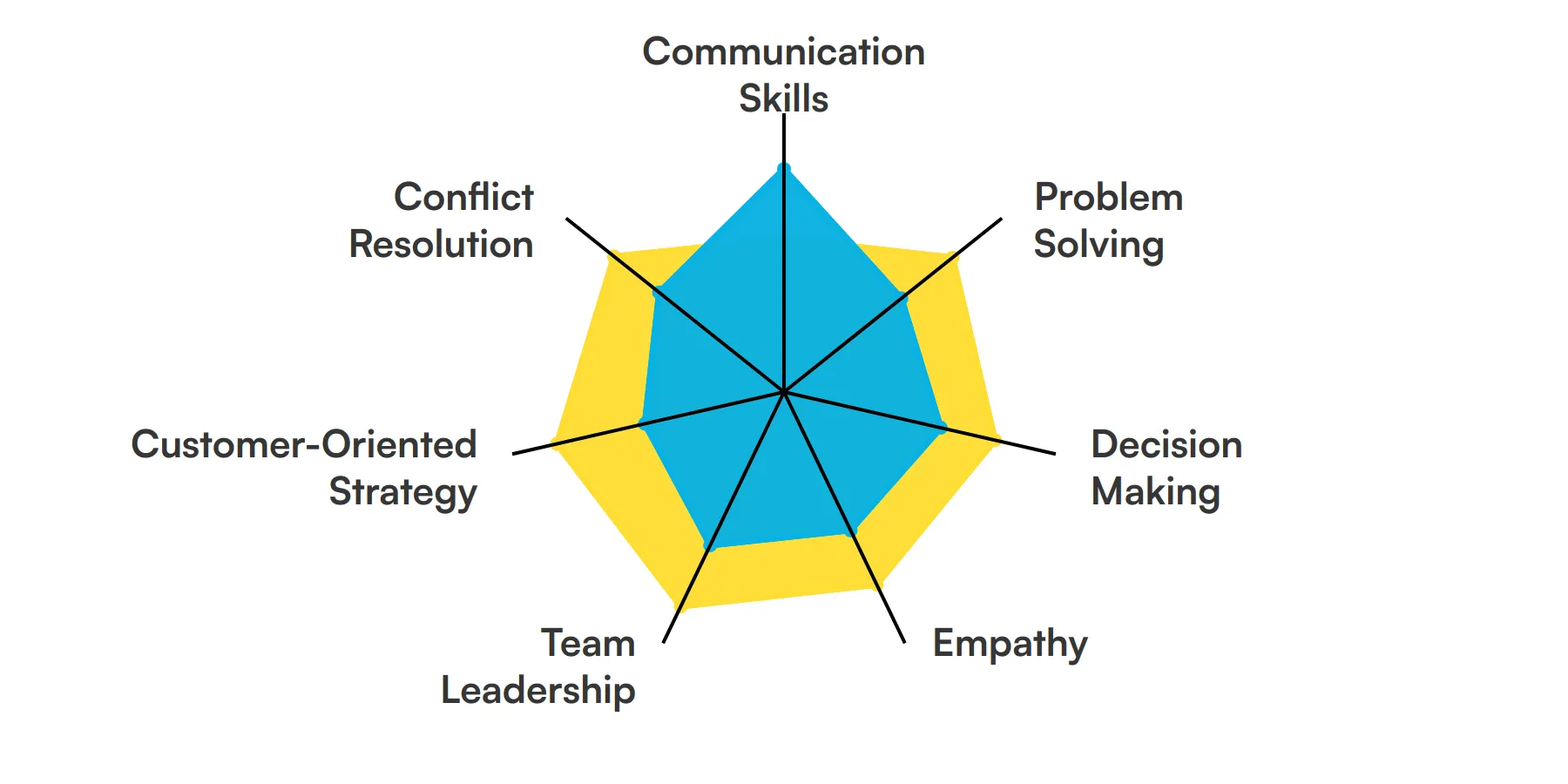
Communication Skills
A Customer Service Manager must articulate information clearly and effectively, both in writing and verbally. They need to communicate complex solutions to customers and relay customer feedback to teams within the organization to improve products and services.
Problem Solving
This role requires the ability to quickly identify the root cause of issues and think logically to resolve them. A Customer Service Manager uses problem-solving skills to handle customer complaints efficiently and maintain customer satisfaction.
Check out our guide for a comprehensive list of interview questions.
Decision Making
Customer Service Managers make crucial decisions that affect customer experiences and company operations. They need to assess situations, consider possible outcomes, and make informed decisions to ensure optimal service delivery.
Empathy
Understanding and sharing the feelings of others is key in customer service. Empathy helps a Customer Service Manager to connect with customers, address their concerns more effectively, and build strong relationships.
Team Leadership
Leading a team effectively is fundamental for a Customer Service Manager. They must inspire, guide, and motivate their team to achieve excellent service standards and meet company goals.
Customer-Oriented Strategy
Developing strategies that prioritize customer needs is essential. A Customer Service Manager uses this skill to design service protocols that enhance customer satisfaction and loyalty.
For more insights, check out our guide to writing a Customer Service Manager Job Description.
Conflict Resolution
The ability to peacefully resolve disputes and prevent potential escalations is crucial. A Customer Service Manager uses conflict resolution skills to handle difficult situations diplomatically and maintain a positive company image.
7 secondary Customer Service Manager skills and traits
The best skills for Customer Service Managers include Technical Proficiency, Data Analysis, Adaptability, Process Improvement, Multitasking, Regulatory Knowledge and Resource Management.
Let’s dive into the details by examining the 7 secondary skills of a Customer Service Manager.
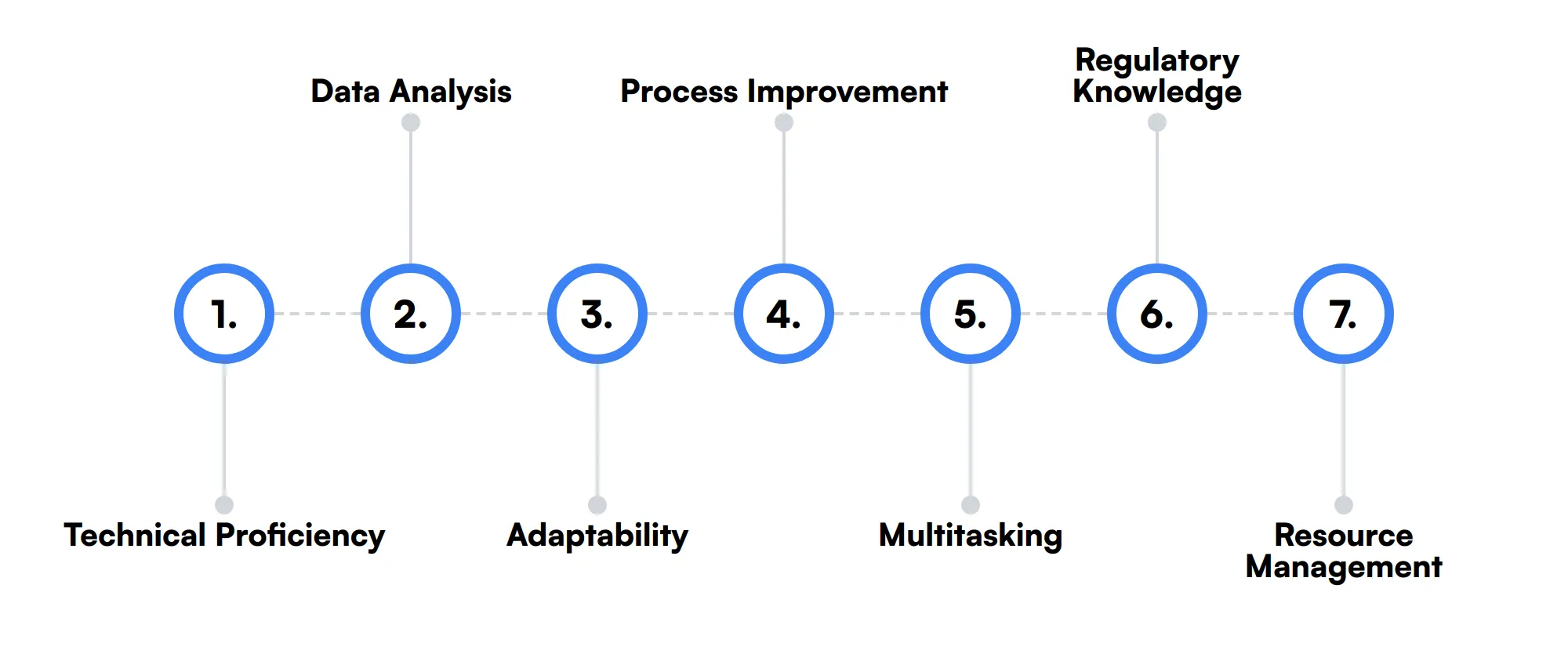
Technical Proficiency
Understanding and using the technology and software that support customer service operations are important for efficiency and effectiveness in this role.
Data Analysis
Analyzing customer feedback and service metrics helps a Customer Service Manager to identify trends, measure team performance, and improve service strategies.
Adaptability
The ability to adapt to changing situations and customer needs is important in maintaining service effectiveness under varying circumstances.
Process Improvement
Continuously seeking ways to improve customer service processes is key to enhancing efficiency and customer satisfaction.
Multitasking
Handling multiple tasks simultaneously is common in customer service management. Effective multitasking ensures that all customer issues are addressed promptly.
Regulatory Knowledge
Understanding relevant laws and regulations ensures that the customer service practices comply with legal standards and protect the company from potential legal issues.
Resource Management
Efficiently managing both human and material resources ensures that the customer service department operates within budget and resource constraints.
How to assess Customer Service Manager skills and traits
Assessing the skills and traits of a Customer Service Manager is more than just reviewing a resume; it involves understanding how they apply their skills in real-world scenarios. The ability to communicate effectively, resolve conflicts, and lead a team are just as important as their technical knowledge.
While traditional interviews can provide some insights, they often fail to capture the full spectrum of a candidate's capabilities in areas like empathy, decision making, and customer-oriented strategy. This is where practical assessments come into play.
To streamline the evaluation process and ensure you're selecting top talent, consider using Adaface assessments. These tests are designed to measure all the key skills necessary for a Customer Service Manager, from problem-solving to team leadership, helping you to achieve a 2x improvement in the quality of your hires.
Let’s look at how to assess Customer Service Manager skills with these 6 talent assessments.
Communication Skills Test
The Communication Skills Test evaluates candidates' communication skills, including verbal and written communication, active listening, and interpersonal skills.
The test covers communication skills, situational judgement, attention to detail, critical thinking, and verbal reasoning. It assesses the ability to effectively communicate with customers, colleagues, and stakeholders in various professional scenarios.
Successful candidates demonstrate strong verbal and written communication, active listening, and the ability to navigate complex interpersonal interactions.
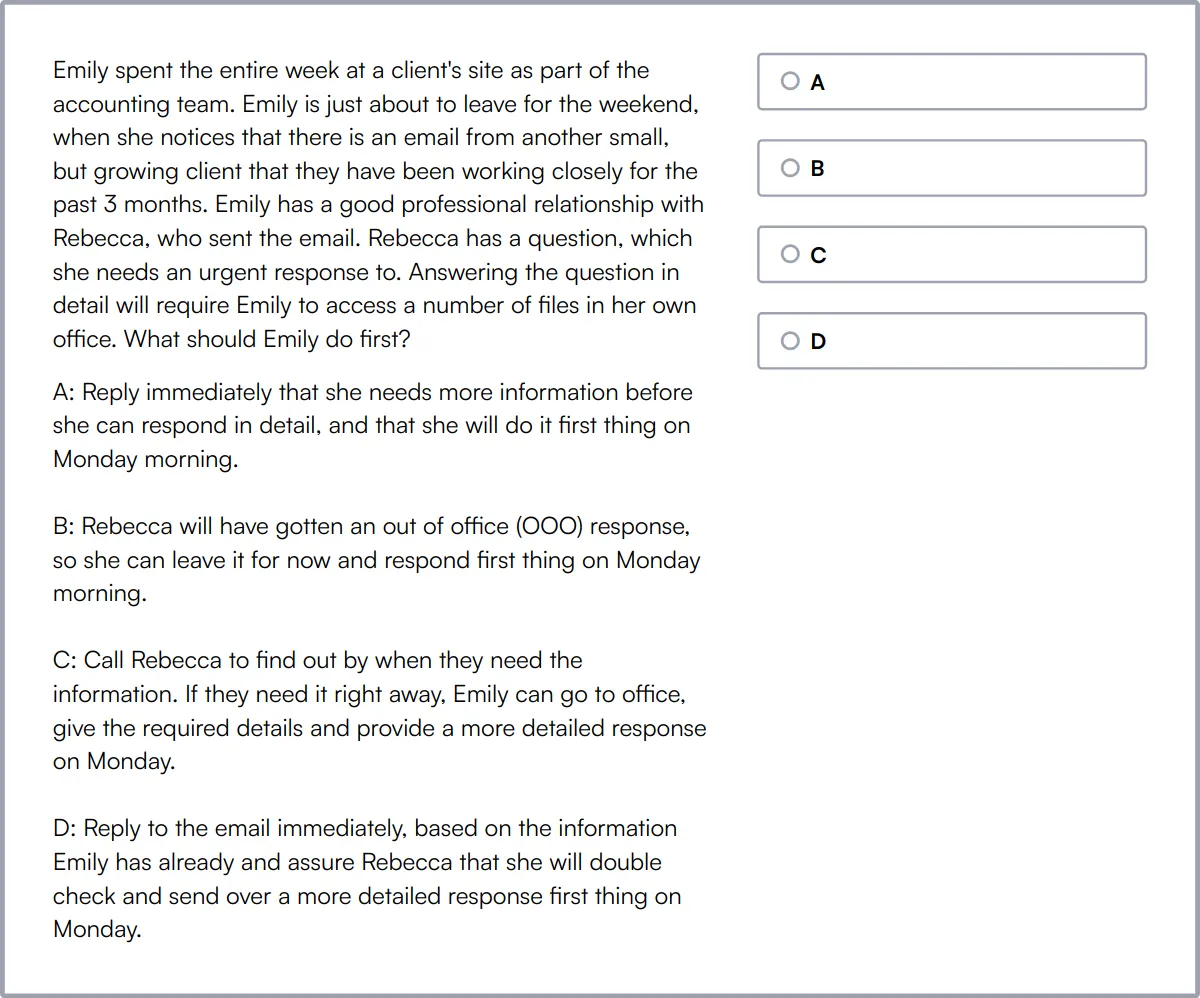
Problem Solving Test
The Problem Solving Test evaluates a candidate's ability to understand instructions, analyze data, and respond to complex problems or situations.
The test covers abstract reasoning, critical thinking, deductive reasoning, inductive reasoning, pattern matching, and spatial reasoning. It provides insights into problem solving, learning agility, and coachability.
High-scoring candidates show proficiency in logical reasoning, data interpretation, and spatial reasoning, indicating strong problem-solving skills.
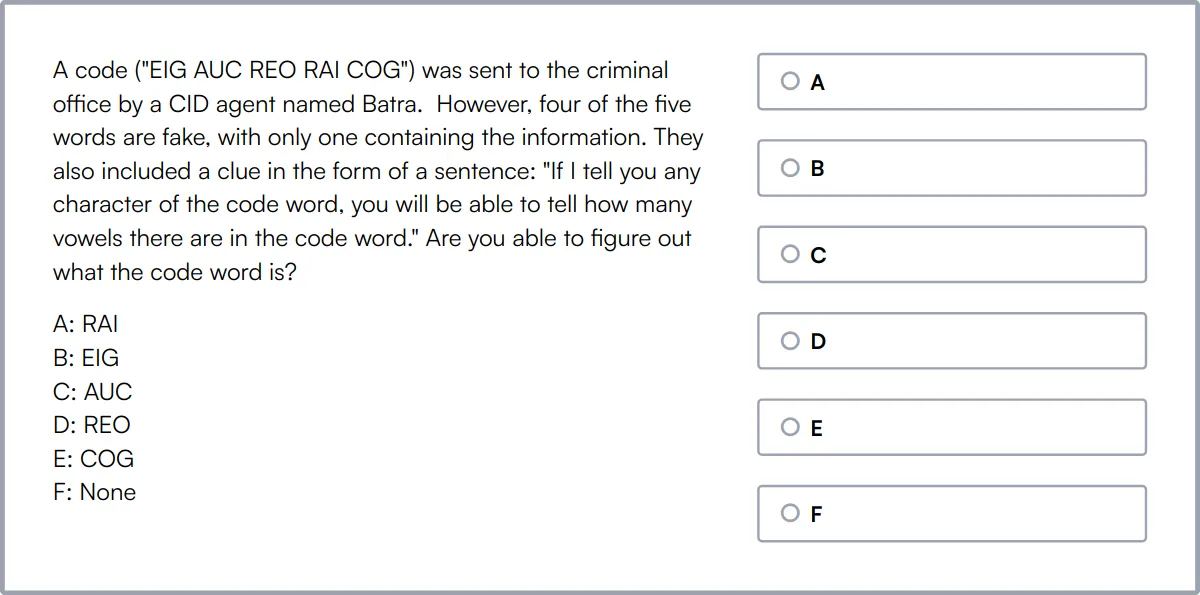
Situational Judgement Test
The Situational Judgement Test uses scenario-based questions to assess a candidate's ability to handle workplace challenges professionally.
The test evaluates rating responses, most effective and least effective responses, problem solving, work management, communication skills, time management, customer service, adaptability, decision-making, and ethics and integrity.
Candidates who perform well demonstrate strong emotional intelligence, relationship building, and teamwork skills.
Customer Service Aptitude Test
The Customer Service Aptitude Test evaluates a candidate's skills in customer service, attention to detail, problem-solving, verbal reasoning, numerical reasoning, and logical reasoning.
The test covers customer service, attention to detail, verbal reasoning, numerical reasoning, logical reasoning, and communication skills.
Successful candidates show strong customer service skills, attention to detail, and the ability to solve problems effectively.
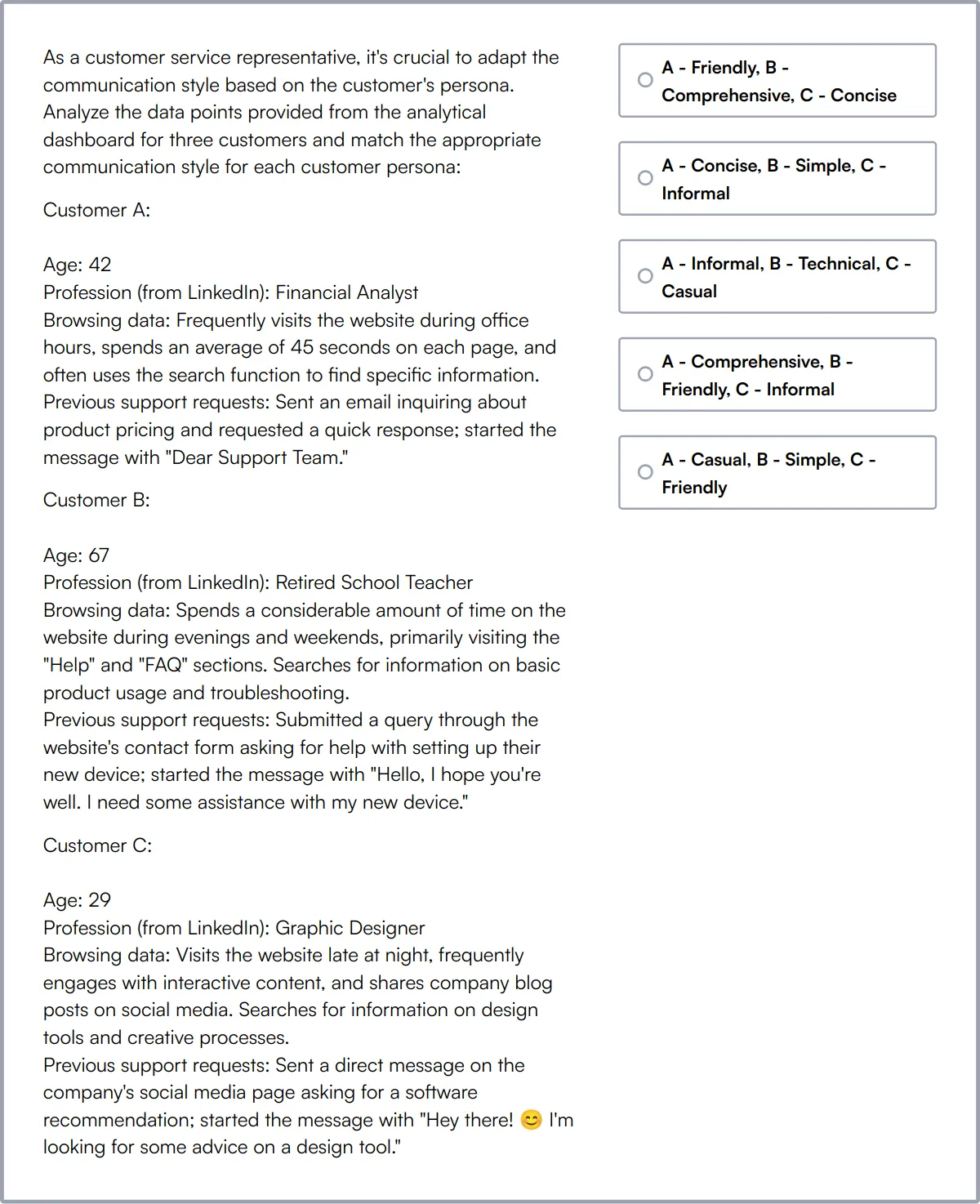
Leadership Psychometric Test
The Leadership Psychometric Test evaluates candidates on their personality traits and cognitive abilities through scenario-based MCQs.
The test covers the Big 5 traits (conscientiousness, agreeableness, openness, extraversion-introversion, neuroticism), emotional intelligence, conflict management, communication skills, decision making, problem solving, time management, strategic thinking, and spatial intelligence.
High-scoring candidates demonstrate strong leadership qualities, strategic thinking, and effective decision-making skills.
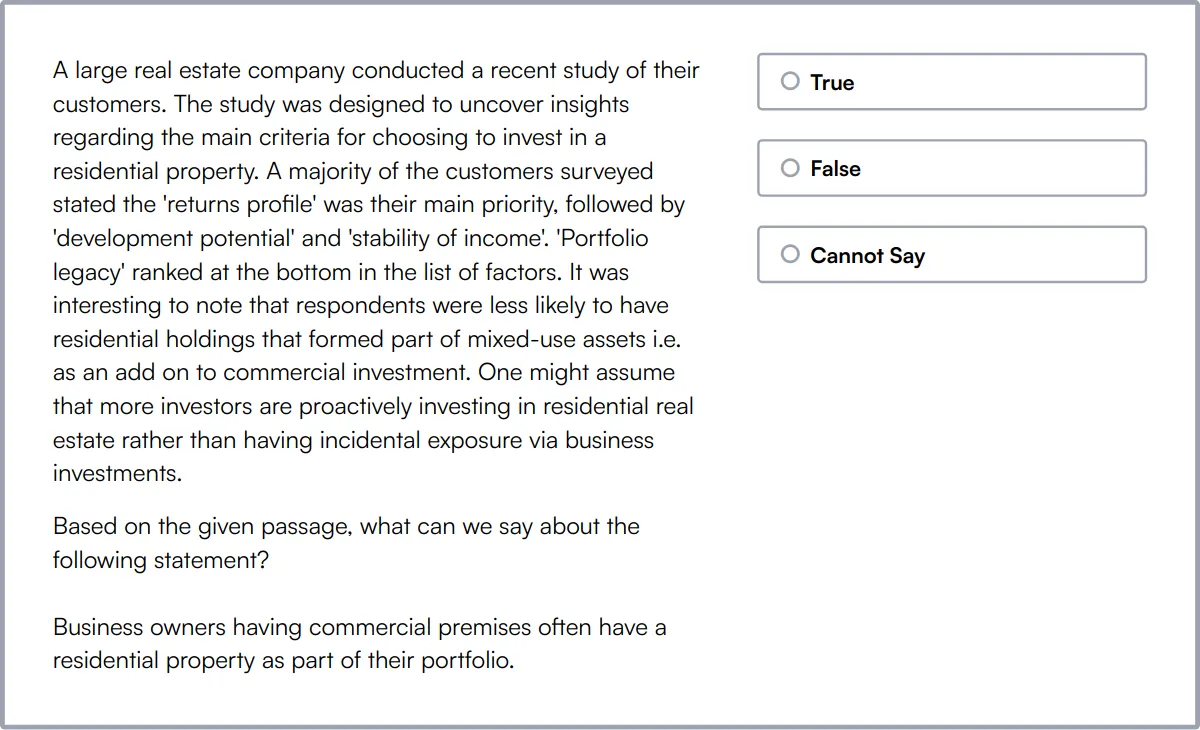
Customer Service Test
The Customer Service Test evaluates a candidate’s ability to understand customer issues, identify the root cause, determine effective solutions, and respond with empathy and professionalism.
The test covers customer service skills, communication, problem-solving, empathy, conflict resolution, product knowledge, time management, attention to detail, and negotiation.
Candidates who excel in this test show strong customer-centric approaches, empathy, and effective problem-solving skills.
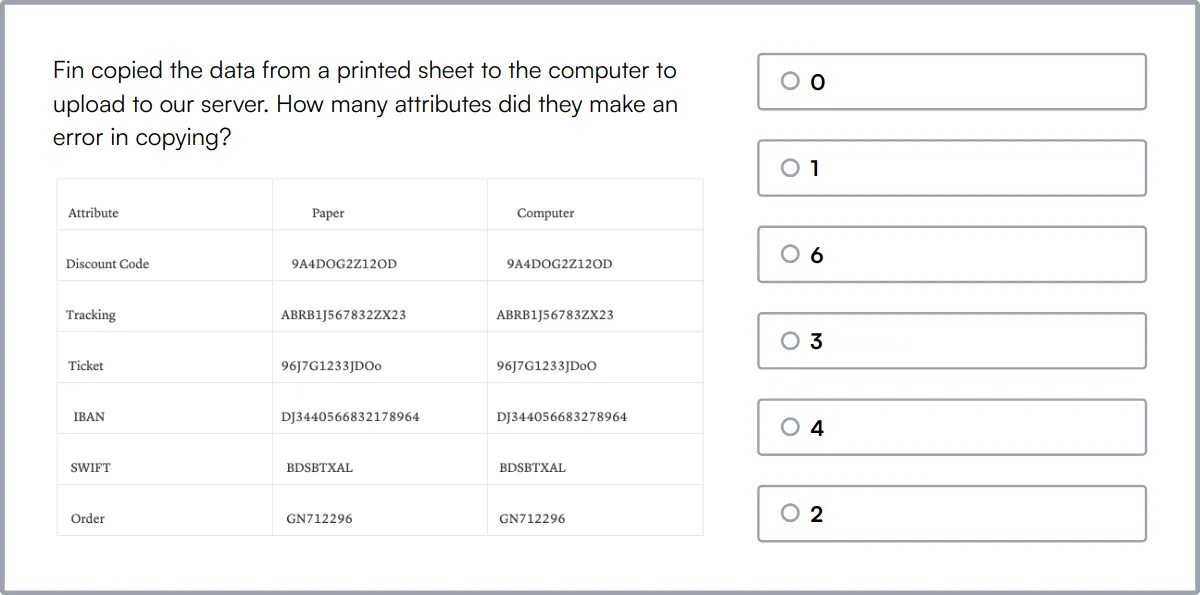
Summary: The 7 key Customer Service Manager skills and how to test for them
| Customer Service Manager skill | How to assess them |
|---|---|
| 1. Communication Skills | Evaluate clarity, effectiveness, and professionalism in verbal and written interactions. |
| 2. Problem Solving | Assess ability to identify issues and implement practical solutions quickly. |
| 3. Decision Making | Observe speed and accuracy in making strategic, informed choices. |
| 4. Empathy | Judge sensitivity and understanding towards customer perspectives and feelings. |
| 5. Team Leadership | Review leadership style and effectiveness in team motivation and management. |
| 6. Customer-Oriented Strategy | Check alignment of strategies with customer needs and business goals. |
| 7. Conflict Resolution | Determine skill in resolving disputes and maintaining professional relationships. |
Customer Service Aptitude Test
Customer Service Manager skills FAQs
How can I assess communication skills in a Customer Service Manager candidate?
Evaluate their ability to articulate thoughts clearly during interviews. Use role-playing scenarios to see how they handle customer interactions.
What are effective ways to test problem-solving skills?
Present real-life customer service issues and ask candidates to outline their approach to resolving them. Look for logical and creative solutions.
How do I gauge a candidate's decision-making abilities?
Ask about past experiences where they had to make quick decisions. Assess their reasoning and the outcomes of those decisions.
Why is empathy important in customer service management?
Empathy helps managers understand customer needs and concerns, leading to better service. Use behavioral questions to assess empathy.
What qualities should I look for in a team leader?
Look for candidates who can motivate and guide their team. Ask about their leadership style and how they handle team conflicts.
How can I evaluate a candidate's customer-oriented strategy?
Discuss their approach to improving customer satisfaction. Look for a focus on customer feedback and continuous improvement.
What methods can be used to assess conflict resolution skills?
Use situational questions to see how they handle disputes between customers and staff. Look for calm, fair, and effective solutions.
How important is technical proficiency for a Customer Service Manager?
Technical skills are important for managing customer service tools and platforms. Test their familiarity with relevant software and systems.

40 min skill tests.
No trick questions.
Accurate shortlisting.
We make it easy for you to find the best candidates in your pipeline with a 40 min skills test.
Try for freeRelated posts
Free resources



